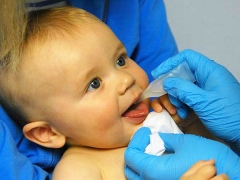Rotavirus vaccination
Rotavirus vaccination is not a mandatory, but the need for such a vaccine may appear in any child. What should parents know about this vaccine to determine whether a baby should be vaccinated?
What is dangerous disease?
In adults, rotavirus infection is often mild, but young children are sick more often and more severely. Each 65 child causes such an infection to lie in the hospital, and every 300th baby dies from it.
For young children, rotavirus is the most dangerous because of its ability to cause large losses of fluid and electrolytes. Owing to vomiting and diarrhea, the baby quickly becomes dehydrated, which often leads to death.
pros
Rotavirus vaccination is available in national vaccination calendars in more than 60 countries of the world. In many of them, after such a vaccination was added to the calendar, the number of infections decreased by 80-90%, and the death rate from intestinal infections dropped by 20-40%.
In this case, the vaccine often does not cause complications, since it is oral. It can even be administered to premature babies and immunocompromised babies.
Possible complications
Almost all babies tolerate rotavirus vaccination very easily. In extremely rare cases, the child’s body may respond to this drug with an allergic reaction, increased irritability, vomiting, or mild diarrhea within 7 days after vaccination. One baby out of 100 thousand vaccinated may develop invagination of the intestine, which requires immediate surgical assistance.
How to prevent complications?
Rotavirus vaccination has a low reactogenicity, however, in order for a child to have it easily, it is important to note that there are contraindications for this vaccination. It does not perform if your baby:
- There is an increased sensitivity to components of drugs, for example, to latex present in the Rotarix vaccine.
- There was a pronounced reaction to the first dose of vaccine.
- Identified malformations of the digestive tract.
- In the past, there was invagination of the intestine.
Also, vaccination should be postponed for any acute illness, except for minor ailments.
Should I vaccinate?
It is very easy to get infected with rotovirus, as a sick person begins to secrete viruses two days before the onset of symptoms, as well as another two months after recovery. The virus persists for a long time at low humidity on different surfaces, relatively resistant to conventional disinfectants and soap. In addition, due to the large number of serotypes, infection with rotavirus is possible several times, that is, after a disease, immunity appears only to the type of virus that caused the disease. If vaccinated, the child will be immune from most serotypes.
Many parents doubt whether the child needs an additional vaccine, if he has been rotavirus-infected once or twice by the age of 5, after which he receives a fairly stable immunity. However, the decision on vaccination must be made taking into account many factors. For example, if the baby is weakened, then the rotavirus will be very hard for him.
Vaccination scheme
Depending on the vaccine, the child is vaccinated against rotavirus twice or thrice. Rotarix vaccine give the baby in 2 months, and then in 4 months. The rotatec vaccine is administered at 2 months, 4 months and six months. There should be at least four weeks between vaccinations.
Opinion E. Komarovsky
A well-known doctor has a positive attitude towards vaccination against rotavirus, since vaccination helps in 70-80% of cases to prevent the disease and in 95-100% of cases to protect against severe disease progression.
At what age are vaccinated?
It is advised to start vaccinating against rotavirus from 6 weeks so that to the peak of the incidence of this infection (6-12 months) the child is already protected from it. The first vaccination is recommended at the age of 6-14 weeks, the last - up to 8 months of age. It is desirable for the entire course to apply the same vaccine, but if necessary, the course of vaccinations can be completed with another drug.
Training
The child must be examined by a pediatrician to identify the presence of contraindications, for example, an acute illness. No other preparation for rotavirus vaccination is required.
How do they vaccinate?
For vaccination against rotavirus use the Dutch drug Rotatek and the vaccine from the UK Rotarix. They are drugs that are administered orally - the right amount of vaccine is instilled into the child’s mouth. The vaccine is contained in a special applicator that has a protective cap. After removing the cap, the contents are injected into the kid's cheek.
Rotatec is administered three times, and Rotarix - two. Immunity begins to be developed after the first vaccination, but after applying for the second time, the child acquires a stable polytypic protection. Both vaccines can be used simultaneously with any other vaccinations, with the exception of BCG.
What if there are adverse reactions?
Vaccination against rotavirus infection rarely has a side effect on the child’s body, but some babies get vaccinated after vaccination, anorexia, loss of appetite, bloating, regurgitation, diarrhea, fever, runny nose, vomiting, rashes and other adverse symptoms. In most cases, such treatment does not require any adverse reactions. The baby can be given drugs that will ease his condition, for example, a fat reducing agent. If the reaction to the vaccination seems very pronounced to parents, you should show the baby to the doctor.













